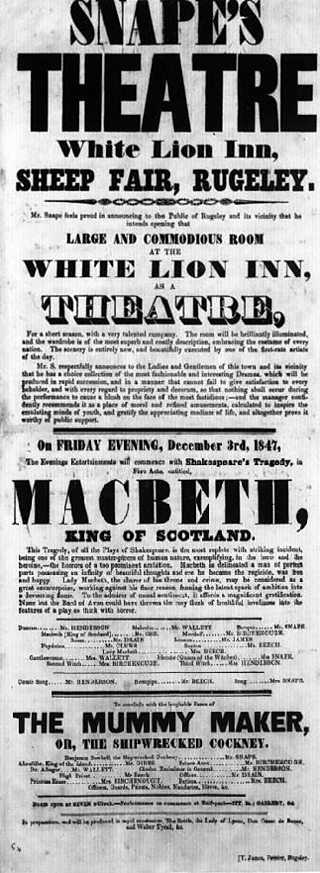Travelling players put on a Shakespeare play in an unconventional setting
Shakespeare was more commonly performed in traditional theatres, but as this playbill shows, his work was also staged in less conventional settings.
Ewes and er, the Dramatic Muse, local events such as the Sheep Fair pulled in the punters and provided a great opportunity to stage some Shakespeare.
-
![]()
Much ado near me
Hear more Shakespeare stories on BBC Radio Stoke
-
![]()
Shakespeare Festival 2016
The BBC celebrates the genius of the bard
Snape’s was one of the main travelling theatre companies and like others, performed at country fairs and venues.

This is a rare example of a playbill about a travelling theatre company.
Here the company are at the White Lion Inn, Rugeley, where they are performing Macbeth and hoping to attract locals and the influx of visitors during the Sheep Fair.
Touring companies such as Snape's performed a variety of different works, not just Shakespeare, but the more serious drama tended to be reserved for the winter – in this case the playbill is dated December 3rd 1847.
It was felt 'lighter' plays and performances were more suited to the spring and summer when the company visited outdoor fairs.
The playbill proclaims that audiences will have the pleasure of enjoying the full five acts of Macbeth, as sometimes the travelling companies performed abbreviated versions for fairground performances and even advertised their programme with short extracts.
Sometimes travelling companies hired well-known actors for a season, but not in this case.
However the playbill elaborates on the 'talent' of the performers, and includes another member of the Snape family, Mrs Snape, in the meaty role of Hecate, Queen of the Witches.
The playbill offers a sumptuous visual feast as not only are the costumes opulent (superb and costly), there is a costume from every nation.
The staging is 'magnificent' and the illuminations are described as 'brilliant'.
This wondrous spectacle is all the more marvellous given that the play is to be performed in a 'large and commodious' room in the pub!
The description also mentions that this company are only there for a short season – in winter travelling theatre companies tended to avoid the bad weather and the discomfort of the roads and spend a few weeks or months in one location.
However we don’t know how long Snape’s actors were staying.
Finally, the writer takes pains to stress the moral propriety of the choice of play.
By elaborating on the performance and the refined nature of the entertainment on offer, this playbill is designed to flatter the most discerning of audiences.
The afterpiece is called 'The Mummy Maker', or 'The Shipwrecked Cockney' – offering a little light relief from Macbeth.
As their work was not particularly valued at the time, it often went unrecorded, but for the theatre-goers of Rugeley it provided a fitting finale to their day at the Sheep Fair.
About Shakespeare on Tour
From the moment they were written through to the present day, Shakespeare’s plays have continued to enthral and inspire audiences. They’ve been performed in venues big and small – including inns, private houses and emerging provincial theatres.

BBC English Regions is building a digital picture which tracks some of the many iconic moments across the country as we follow the ‘explosion’ in the performance of The Bard’s plays, from his own lifetime to recent times.
Drawing on fascinating new research from Records of Early English Drama (REED), plus the British Library's extensive collection of playbills, as well as expertise from De Montfort University and the Arts and Humanities Research Council, Shakespeare on Tour is a unique timeline of iconic moments of those performances, starting with his own troupe of actors, to highlights from more recent times. Listen out for stories on Shakespeare’s legacy on your BBC Local Radio station from Monday 21 March, 2016.
You never know - you might find evidence of Shakespeare’s footsteps close to home…
Craig Henderson, BBC English Regions
-
![]()
Shakespeare Lives
The nation’s greatest performing arts institutions mark 400 years since the Bard's death
Related Links
Shakespeare on Tour: Around Stoke
-
![]()
Small town proves a big attraction for Shakespeare's players
Congleton recorded as a regular stop for the King's Men
-
![]()
Celebrated young actor stars as Hamlet
Child prodigy actor who took theatres by storm in 1804 stars as Hamlet in Stafford
Shakespeare on Tour: Around the country
-
![]()
The 18th century impersonator who was 'the Jon Culshaw of his day'
The city gets its prestigious Theatre Royal
-
![]()
The Northampton Repertory Theatre
Pieces of history in Northampton
-
![]()
Drunken robbers threaten the leader of Shakespeare's players
As he collects admission money at the door!
-
![]()
Shakespeare's tragic heroes appear in Launceston
Size not everything as Shakespeare's tragic heroes appear in remote town of Launceston









